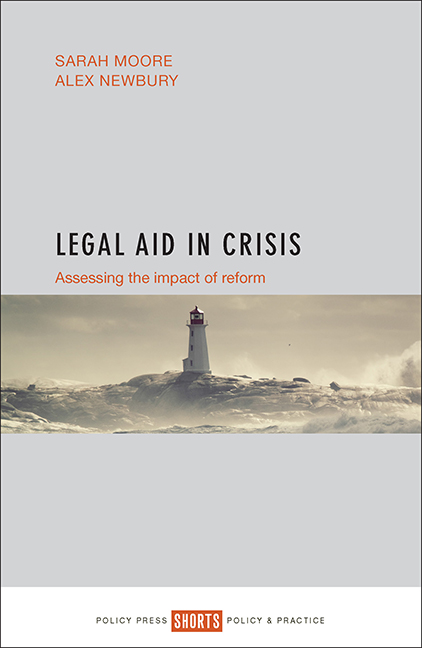Book contents
- Frontmatter
- Dedication
- Contents
- List of abbreviations
- Acknowledgements
- 1 Legal aid in crisis
- 2 Legal aid reform in historical and international perspective
- 3 Assessing the consequences of legal aid reform in England and Wales
- 4 Towards a holistic conception of legal aid
- 5 Refocusing the debate about legal aid
- List of statutes
- References
- Index
3 - Assessing the consequences of legal aid reform in England and Wales
Published online by Cambridge University Press: 05 April 2022
- Frontmatter
- Dedication
- Contents
- List of abbreviations
- Acknowledgements
- 1 Legal aid in crisis
- 2 Legal aid reform in historical and international perspective
- 3 Assessing the consequences of legal aid reform in England and Wales
- 4 Towards a holistic conception of legal aid
- 5 Refocusing the debate about legal aid
- List of statutes
- References
- Index
Summary
In 2014, the National Audit Office rather damningly observed that the Ministry of Justice had implemented the far-reaching reforms introduced by the Legal Aid, Sentencing and Punishment of Offenders Act 2012 (LASPO) ‘without a good understanding of why people go to court to resolve their disputes’ (National Audit Office, 2014: 7, key finding 11). It highlighted a wide range of potential consequences that could stem from the cuts as unrepresented parties are left unsupported with potentially unresolved cases. It flagged the potential increased costs for the wider public sector, which may be left to pick up the pieces if an unrepresented litigant suffers mental or physical health issues due to the lack of legally funded advice and support (National Audit Office, 2014: 6, key finding 6). This chapter will consider these wide-ranging consequences, and how far alternatives such as mediation and McKenzie friends are able to plug the gap.
Thus, these far-reaching reforms have been carried out extremely quickly and apparently with little understanding of the potential impact they will have. Many organisations, including the Ministry of Justice and Legal Aid Agency (2014), the Public Accounts Committee (2015), the Low Commission (2014; 2015), and the Legal Action Group (2010) have rushed to understand the impact. Academics (Pleasence et al, 2012; Trinder et al, 2014) and lawyers (Knight, 2014; Magistrates Association, 2015; 2016) have reported on the impact for the court, litigant and lawyer. This chapter reviews that evidence. However, as we discuss, the focus in this body of literature tends to be on measurable and tangible effects. Yet these effects, we will go on to argue in Chapter Four, are the tip of the iceberg in relation to the real impact of the reforms.
The decline in publicly funded legal advocacy and support
The cuts to legal aid have had a direct effect on the number of cases for which publicly funded legal support and representation is provided.
- Type
- Chapter
- Information
- Legal Aid in CrisisAssessing the Impact of Reform, pp. 37 - 56Publisher: Bristol University PressPrint publication year: 2017



